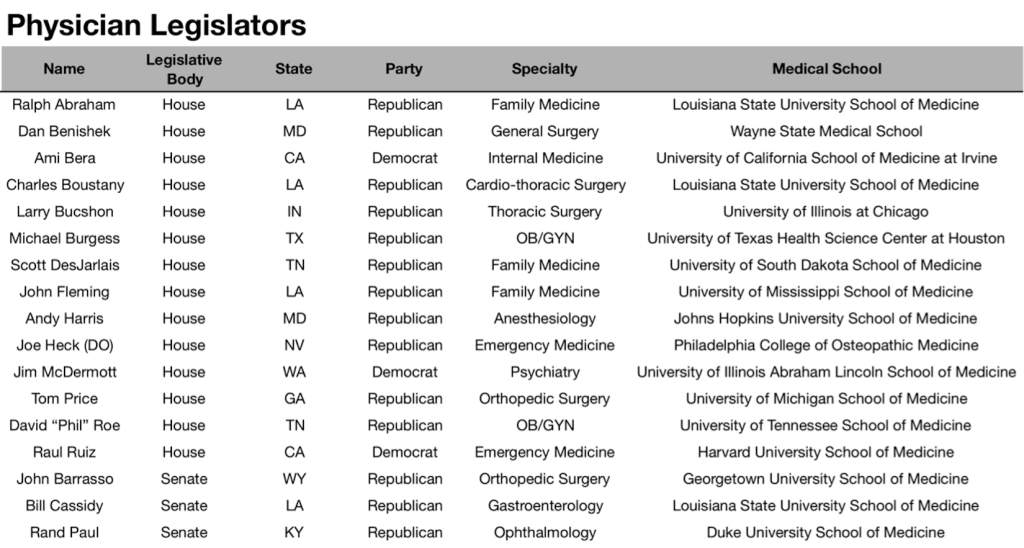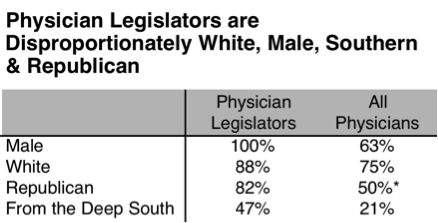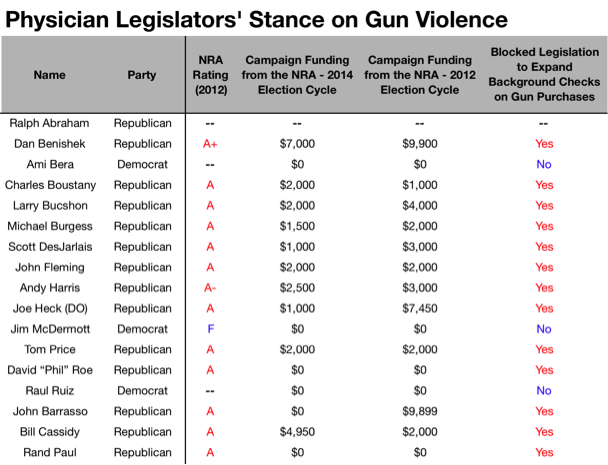“I never saw a body with bullet holes that was more devastating than taking the right to arm ourselves away.” —Dr. Ben Carson, GOP presidential candidate, retired neurosurgeon and recipient of $37,622 from pro-gun groups during the 2016 election cycle.
Gun violence is a public health crisis.
On your average day in America, 297 people are victims of gun violence. They are shot in murders, assaults, suicide attempts and completions and police interventions. 89 of these victims died — seven of which were children. In the first 90 days of 2016, there have been 57 mass shootings. Your average American is now equally as likely to die via firearms as in a car crash.
Statistics like these, and the heart-wrenching stories that accompany them, have elicited a public outcry that our country must do better. This December, The New York Times, in their first front-page editorial since 1920, demanded an end to the “epidemic” of gun violence. In a follow-up piece, President Barack Obama, described gun violence as “one of the greatest threats to [the] public health and safety of the American people.”
Eight professional health organizations echoed this language in 2015, calling for physician leadership in tackling the epidemic. By framing gun violence as a public health crisis, these institutions have highlighted the moral and professional obligation the medical community has to help reduce gun-related morbidity and mortality.
In 2013, editors of the Annals of Internal Medicine delineated five broad roles for physician engagement in the movement to reduce gun violence: clinicians, managers of fear, researchers, policy advocates and legislative leaders. Specifically expanding on the last category, the authors called for physicians to “lead by example in the statehouses and halls of Congress.”
Physician legislators are in powerful social and moral positions to lead the charge on bipartisan, common sense gun restrictions that will save lives. As outlined by the American Medical Association, physicians have an ethical obligation to contribute to “the improvement of the community and the betterment of public health.” Many physicians are intimately familiar with the devastating physical and psychological impacts of gun violence on its victims, perpetrators, and communities. Given the frequency with which victims of firearms utilize health care services, most physicians have likely come face to face with gun-related morbidity at some point in their training. Additionally, physicians as a profession have long held significant social capital and public respect — whether deserved or not. A 2012 Angus Reid Public Opinion poll highlighted that 90 percent of surveyed Americans had a “great deal” or “fair amount” of respect for physicians — nearly double the amount that responded in kind for business executives and lawyers. This trifecta of a moral and professional commitment to the health and safety of patients, firsthand intimacy with the firearm issue and considerable public authority could be a potent one in moving the needle on gun violence.
Unfortunately, the physicians in our national legislature show a stunning lack of leadership on this issue.
Physician Legislators: Who Are They?
There are 17 physician legislators in the 114th National Congress. All 17 are men, 15 are white, eight represent the deep south, and 14 are Republican. Their specialties range from family medicine to orthopedic surgery, and they received their medical education all over the country, primarily at public medical schools.
Political identification of physicians has not been extensively studied. Data from this figure is from a 2014 JAMA study measuring physician financial contributions by party to national campaigns in 2012. Other table data sources: 1, 2, 3
Remarkably, most of these physician legislators hold stances on gun regulation that run directly counter to the evidence-based policy recommendations proposed by the eight health professional organizations. Every single one of the Republican physician legislators was given an “A” rating by the National Rifle Association (NRA), reflecting a strongly pro-gun voting track record. Practically all of the Republican physicians-legislators in the Congress received significant campaign funding from the NRA in 2012 and 2014.
The legislators’ social media presence and press releases leave their stances on gun regulation crystal clear. Dr. Tom Price’s campaign wrote in a 2016 press release, “We know that the safe use and responsible ownership of firearms has time and time again safeguarded individual and public safety. In fact, guns are used more often to protect lives, not take lives.” Dr. Dan Benishek (R-MI) in 2013 tweeted, “Let me be clear, I will fight any efforts to take our guns. Not on my watch.”
Actually, 2012 Violence Policy Center analysis found that criminal homicides outranked “justifiable” homicides by a factor of 32 to 1. Director of the Harvard Injury Control Research Center Dr. David Hemenway described the NRA’s estimates of 2.5 million Americans using guns in self-defense annually as “not plausible,” noting that it has been “nominated as the most outrageous number mentioned in a policy discussion by an elected official.”
For “support of universal background checks,” Senators were ranked on how they voted in April 2013 on Machin-Toomey ammendment, which would have expanded background checks for gun purchases at gun shows and online. House representatives were rated based on whether or not they have signed on to co-sponsor HR 1565, which would have expanded background checks to all online and gun show sales. Other table data sources: 1, 2, 3
The Democrat physician-legislators, while not taking campaign funds from the NRA and generally voting for increased regulation of firearms, also leave something to be desired in terms of true leadership on the issue. Dr. Jim McDermott (D- WA) sponsored the Brady Handgun Bill in 1993, but neither Dr. Raul Ruiz (D-CA) nor Dr. Ami Berra (D-CA) have lead the charge in proposing legislation to regulate firearms. And, for what it’s worth, on their official websites, none of the three Democratic physicians directly highlight reducing gun violence as a professional priority.
The current cohort of physicians in the national legislative body represents a true missed opportunity for physician leadership on the issue of gun violence. They are well situated to transcend partisan politics and push forward common sense legislation that has not only been shown to save lives in states that have enacted them, States with more expansive background check laws have markedly less gun trafficking, fewer deaths of women shot by an intimate partner and fewer gun suicide rates. A 2016 study in the Lancet projected that enacting universal background checks on a federal scale would reduce mortalities due to gun violence by more than half. Further, a 2015 Pew Research poll found that 79 percent of Republican and 88 percent of Democratic citizens support expanded background checks for gun purchasers. Among physicians, data suggests that the consensus may be even stronger — 95 percent of internists support such regulation. And yet, every single Republican physician legislator has blocked legislation to expand background checks.
To take another example, legislation was proposed in the Senate days after the San Bernadino mass shootings that sought to keep individuals on the Federal Bureau of Investigation’s (FBI’s) terror watch list from purchasing firearms. Former President George Bush proposed similar legislation in 2007, and President Obama echoed the need for such regulation, commenting to CBS News in the wake of the attacks that “we have a no-fly list where people can’t get on planes but those same people…could go into a store right now in the United States and buy a firearm and there’s nothing that we can do to stop them. That’s a law that needs to get changed.” All three Senate physicians voted against the bill.
It may seem like an unlikely comparison, but the debate regarding concussions in football has some pertinent examples for how our physician legislators could be acting. The Ivy League football coaches, led by Dartmouth’s Buddy Teevens, unanimously agreed in February to abolish tackling from regular season practices due to concerns about brain trauma. Being the first few to make changes like this one is challenging, of course. College students, loyal fans, dedicated players and sometimes even powerful alumni with deep pockets love football, and don’t want to see their game change. But witnessing the coaches themselves consider the data and ultimately put the health and safety of their team above all else is inspiring. It shows that player-focused, patient-focused, human-focused decision making based on evidence can and should be done, regardless of the money at stake or the entrenched interests.
“Tired of politicians playing politics w/ guns, putting lives at risk b/c they’re scared of the NRA. Guns are a health care issue.” –Dr. Vivek Murphy, Surgeon General, 2012 tweet.
What Can We Do About It?
It’s easy to read about this issue (you) and write about this issue (me). But it’s much harder to actually change things. How do we put pressure on physician legislators to help address the gun violence epidemic in this country?
First, if you are the constituent of any of these legislators, contact them and let them know your views on the epidemic of gun violence and the role they could play in stopping it. If you have a way to make a personal connection with these men, whether it’s because you both went to the same medical school or because you practice the same specialty, make it. Ask them to consider stepping up and being the Buddy Teevens of gun violence.
As medical students, we may feel like we’re at the bottom of the totem pole. But, we must be bold enough to challenge these powerful legislators, like our colleagues at the University of Michigan who wrote an op-ed in the school newspaper regarding their disappointment in University of Michigan alumnus Tom Price (R-GA) for pursuing legislative actions that “directly contradict the values we believe, as future physicians, are essential to advancing our field and serving our patients.” Our patients deserve no less. We must call on these physician-legislators to uphold the most basic tenants of the medical profession: respect for human life and a scientific mindset. The data are clear on this issue. Increased regulation of firearms saves lives. To continue to vote otherwise is shameful. They must be held responsible not only by their constituents, but by you and me, their fellow members of the medical profession.





